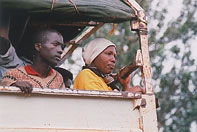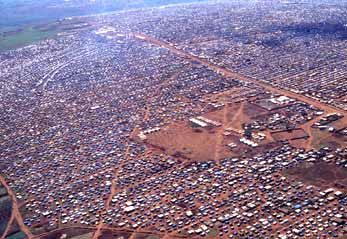|
afrol News, 13 January - The question whether the "rushed" repatriation of 25,000 Rwandan refugees from Tanzania in December really was "voluntary" has again been forcefully raised. The Tanzanian government had given the refugees an ultimatum of little more than two months to "repatriate voluntarily." Pressure had been high. The Washington-based US Committee for Refugees today raises critical voices against the repatriation of the last remaining Rwandan refugees in Tanzania, accomplished in a hurry last month. The UN refugee agency UNHCR, which assisted the gigantic repatriation exercise, all along maintained that Rwandan refugees had "expressed growing interest in returning to their homeland." UNHCR and the governments of Rwanda and Tanzania abruptly announced in Geneva, Switzerland in October 2002 that the estimated 25,000 mostly ethnic Hutu Rwandan refugees who remained in Tanzania should voluntarily repatriate by 31 December 2002. The Tanzanian government made it clear that Rwandan refugees would not longer be welcome after that date. - The repatriation operation, which began and ended ahead of schedule, remains problematic for several reasons, spokesman Joel Frushone of the US Committee for Refugees holds. First, it had been the Tanzanian government that "again triggered a controversial repatriation that appears to have been less than fully voluntary." - UNHCR/Tanzania and UNHCR/Rwanda were caught by surprise by the Tanzanian government's repatriation deadline and were slow to react in a manner to ensure that Rwandan refugees would repatriate in safety and dignity, the US group says. The UN agency earlier this year confirmed its officials had "worked around the clock to register those rushing to sign up for return ahead of the 31 December deadline." Also this rapid registration had been a problematic issue, the US group holds. In setting a sudden deadline for voluntary repatriation, the Tanzanian government had "failed to implement simultaneous procedures to individually screen Rwandan refugees unwilling to repatriate," in order to determine whether they should retain refugee status. It is believed that, among these last remnants of the 1994 Hutu mass exodus, there might still have been individuals "complicit in Rwanda's 1994 genocide." Although Tanzania is one of the largest refugee-hosting countries in Africa, with refugee populations outnumbering local residents in some areas, the Tanzanian government has been increasingly criticised for its treatment of refugees during the past eight years; in particular Rwandan refugees. Government officials "periodically have mounted aggressive and highly controversial efforts to repatriate Rwandan refugees under less than fully voluntary circumstances," Mr Frushone of the US refugee group says.
In 1996, Tanzanian authorities had pushed nearly a half-million Rwandan refugees home, claiming that they were better off in Rwanda than in Tanzanian refugee camps, where they lived under the control and intimidation of Rwandan refugee leaders suspected of complicity in Rwanda's 1994 genocide. In 1999, government officials ordered all remaining Rwandan refugees to repatriate, but fewer than 1,000 heeded the order. During 2000-2001, with the number of Rwandan refugees again on the increase, Tanzanian authorities expressed a growing desire to confine the refugee population to designated camps and encouraged them to repatriate. About 5,000 Rwandans voluntarily returned home during the first 10 months of 2002. With approximately 22,000 Rwandan refugees still in Tanzania in October 2002, an increasingly impatient Tanzanian government suddenly decreed that all remaining Rwandan refugees should depart the country by 31 December 2002. During November 2002, representatives of the US Committee for Refugees visited Tanzania and Rwanda to examine the repatriation of Rwandan refugees living in Tanzania. The findings clearly conclude on an operation that was neither well planned nor in line with the wishes of the refugee population. Having been taken by surprise by the Tanzanian government, the UN refugee agency nevertheless agreed to organise the repatriation in October. However, neither the agency's Tanzania nor Rwanda offices had the manpower nor equipment to fulfil the task, the US group's study had shown. Thus, the reception of the first convoy on 6 November had been disastrous: "No UNHCR/Rwanda staff were present to receive the first convoy of returnees at the Rwandan government's designated reception centre. Neither UNHCR/Rwanda nor the government of Rwanda had constructed structures to shelter the repatriating refugees, who disembarked and huddled together on the wet grounds of the administrative headquarters in a chilling rain." Refugees interviewed by the group in November agreed the repatriation was organised too rapidly. "Yes, I eventually wanted to return to Rwanda, this is where I was born and want to die," 62-year-old Rose told the US group. "I just wish I had more time to prepare. Moving in a rush like this is difficult for an old woman like me." - Why am I going home? a 35-year-old Rwandan refugee from Kibungo province rhetorically asked the US Committee for Refugees. "Because Rwandans and Tanzanians in positions of authority made it clear that they want me to go home. Otherwise, I would stay here with my family until I was ready to go on my own terms." The US group concludes that the UN refugee agency had given into Tanzanian pressure when it agreed to organise the repatriation. "UNHCR should have negotiated a more reasonable schedule for the repatriation of Rwandan refugees living in Tanzania or should have delayed commencement of the exercise until a safe and dignified return could be ensured," Mr Frushone says. The UNHCR, on the other hand, earlier this year celebrated that the "eight-year Rwandan refugee saga in Tanzania" came to an end. While the UN agency in November proudly spoke about the "voluntary repatriation" of the last Rwandan refugees, the word "voluntary" suddenly disappeared from the agency's news briefings during December and reporting from Tanzania slowly became less sparkling. Sources: Based on US Committee for Refugees, UNHCR and afrol archives
|
front page
| news
| countries
| archive
| currencies
| news alerts login
| about afrol News
| contact
| advertise
| español
©
afrol News.
Reproducing or buying afrol News' articles.
You can contact us at mail@afrol.com


